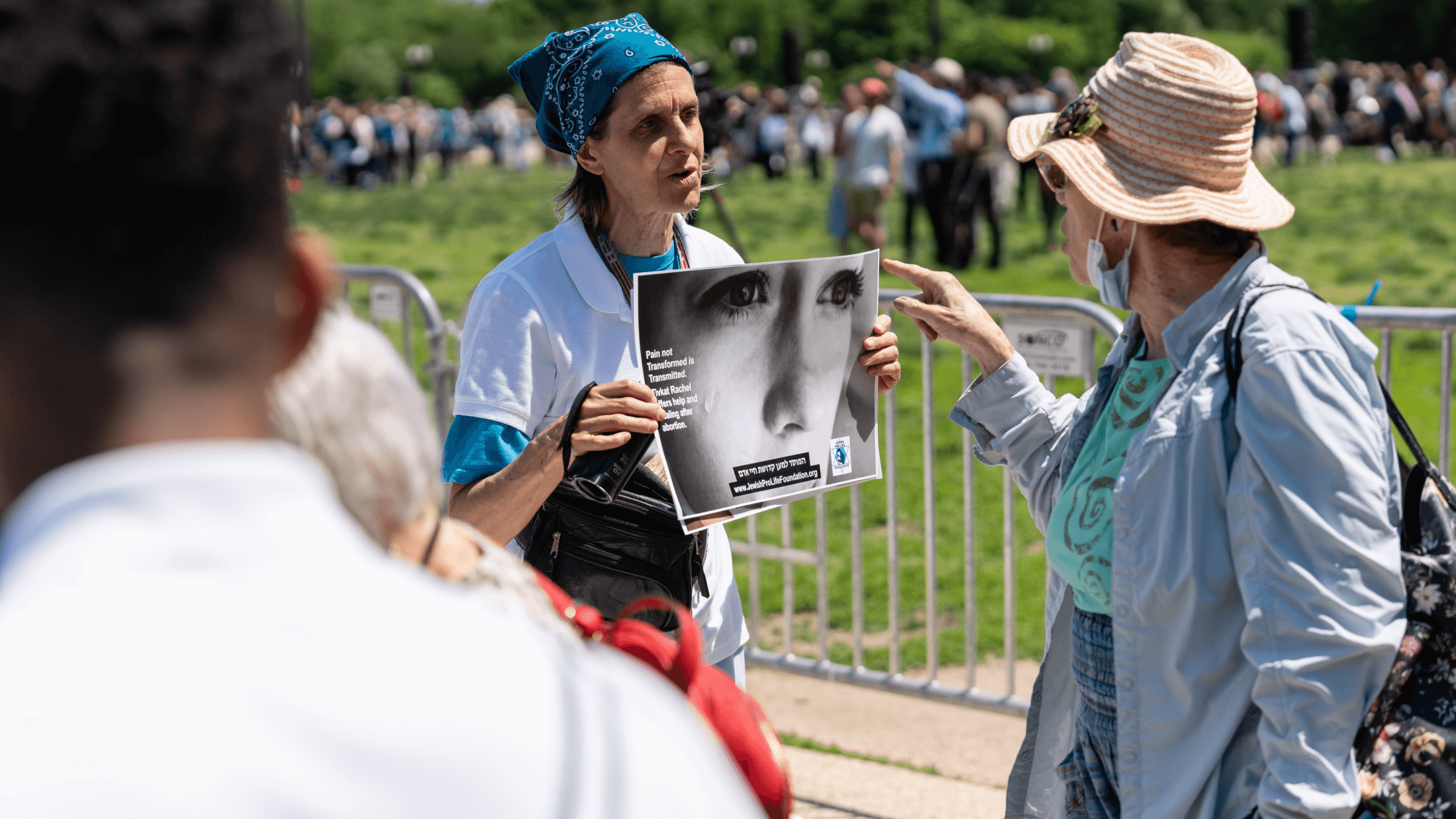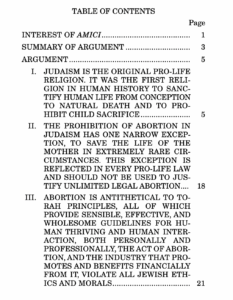On the Supreme Court docket, a Jewish anti-abortion group gets a Christian megaphone
One SCOTUS observer called the partnership ‘quite irregular’

Cecily Routman, the head of the Jewish Pro-Life Foundation, at Tuesday’s Jewish Rally for Abortion Justice in Washington, D.C. Photo by Eric Lee
After the Supreme Court agreed to hear the abortion case that is now roiling the nation, one of the groups that weighed in was a small nonprofit called the Jewish Pro-Life Foundation.
In an official filing to the court called an amicus brief, the foundation cited the Torah, telling the court that “Jewish law prohibits abortion and Judaism obligates us to protect innocent life in the womb.”
Most American Jews disagree with that position — 4 out of 5 support abortion rights, according to a recent Pew poll — and while Jewish law on the matter is complicated, it actually requires abortion in some circumstances.
But what made the brief especially unusual was the organization that wrote and paid for it: a Christian nonprofit called The Justice Foundation. One court observer called it “quite irregular” for a Christian group to work with a Jewish group in this way. But the Jewish woman who says she sought out the partnership feels only gratitude for the assistance that allowed her to put her views before the court.
It was one of four amicus briefs filed by the Texas-based organization, whose stated mission is “to restore proper respect for God’s word and law to American jurisprudence.”
A few other Jewish parties added their names to the brief, including the Coalition for Jewish Values, an Orthodox organization founded during the Trump administration that promotes conservative viewpoints.
But the engine of the brief was the Jewish Pro-Life Foundation and its founder, Cecily Routman, who said in an interview that she enlisted The Justice Foundation’s help after she was unable to find a Jewish lawyer to do the filing. She said she outlined the main points of her argument and Justice Foundation attorney Allan Parker wrote the brief — taking no money for it and covering more than $1,000 in printing costs.
The Justice Foundation, she said, is made up of “Israel-loving, Jewish-loving Christian people.”
“You know, historically, good Christian people have helped us in many ways,” Routman, 63, said. “So they’re helping us again.”
Very few amicus briefs come to influence the outcome of a Supreme Court decision, but Dobbs v. Jackson Women’s Health Organization, the case in which the court seems poised to overturn the landmark 1973 abortion ruling in Roe v. Wade, has attracted an unusually high number — 140. Even when they don’t sway the justices, amicus briefs carry a symbolic heft, and may be quoted by justices in their questioning of lawyers, or in their opinions and dissents. Depending on the case, briefs with the imprimatur of a religious group can be particularly compelling.
Joshua Matz, partner at Kaplan Hecker & Fink, a public interest litigation firm that files several amicus briefs at the Supreme Court each year, said that it was typical for different religious groups to partner on an amicus brief — pro-abortion rights Catholics worked with the National Council of Jewish Women on a brief supporting Jackson, for example. And firms who submit briefs will often represent their clients pro bono. But this brief, purporting to represent Jewish beliefs but written and funded by a Christian group, Matz said, was different.
“A lawyer’s job in an amicus brief is to present their client’s voice and arguments,” Matz said. “But what happened here seems quite irregular. If this brief was proposed, researched, written, filed, and otherwise conceptualized and orchestrated entirely by a Christian group, one might reasonably question who is actually speaking here.”
But Routman is far from a passive observer on the brief, and she takes credit for conceptualizing it. She is a dedicated anti-abortion advocate whose nonprofit is not only her full-time job — it’s also the primary expression of her Judaism.
‘Saving Jewish Lives, Healing Jewish Hearts’

Routman, a resident of Sewickley, Pennsylvania, outside Pittsburgh, grew up in the area in what she called a “normal, Jewish suburban household,” in which her dad prayed every day and the family went to synagogue every week. She was taught the mainstream Jewish position on abortion — which is that abortion may be permitted in certain circumstances.
Later in life, she said, a combination of “personal anguish, this sense of aimlessness and unhappiness with the secular world and materialism” caused her to re-examine her beliefs on the matter. She found more anti-abortion advocacy online.
It was hearing a Jewish woman on the radio say that abortion bans violated her religious freedom that pushed Routman to found her own nonprofit in 2006.
In the decade and a half since, she has almost single-handedly created a deep repository of anti-abortion education and advocacy resources, which includes a YouTube channel and an anti-abortion meme bank. An eight-person team runs the organization, according to its website, with Routman’s husband as treasurer.
The Jewish Pro-Life Foundation reported receipts of $12,465 in 2020. Routman, who said she runs it full-time and depends on an inheritance for financial support, does not take a salary.
That Jews as a group lean heavily in favor of abortion rights does not discourage her. On the contrary: she sees part of her role as counteracting their activism.
“When Jews are very out in the public as pro-abortion advocates, Judaism is seen as a religion that believes in killing children, and it foments antisemitism,” Routman said. “So we’re happy to be on the other side of it.”
But being in the Jewish minority on the issue comes with a downside: it made it hard to find a Jewish lawyer to take her case forward.
Making a match

As Routman tells it, the seeds of the partnership were sown at the March for Life, an anti-abortion rally in Washington where she connected with The Justice Foundation’s Israel liaison. A year later, after her friend who runs the Jewish Coalition For Religious Liberty — an anti-abortion group that filed its own Dobbs amicus brief — told Routman she should file her own brief, she asked her Justice Foundation contact for help.
“I mentioned to her that I needed an attorney to file a brief for us at the Supreme Court,” Routman recalled, “and she said, ‘Well, we might be able to file that for you. Why don’t you send along the draft?’”
Though anyone can file an amicus brief at the Supreme Court, each brief must also have a “counsel of record,” a lawyer admitted to the court’s bar. It was an easy call for Justice Foundation co-founder Allan Parker, a member of the bar, who represents all of the Foundation’s clients pro bono.
“I felt very honored that they would ask us to do it,” Parker said.
The Justice Foundation — which does not affiliate with any Christian denomination, though Parker is an ordained Baptist minister — reported $763,511 in receipts in 2019, according to its most recent IRS filing, and expended about $53,882 in grants to other individuals and groups.
Routman, who said she sought divine inspiration for the task, then wrote her arguments: Judaism is a religion that holds life sacred, abortion is antithetical to Torah principles, and Jewish people have a moral authority on sanctity of life issues because of their experience in the Holocaust.
“All I know is, I stood in front of my computer, and I prayed to Hashem,” Routman said, referring to God. “And I said, ‘What do you want the court to read? What do you want the court to know? What do you want to tell the Supreme Court of the United States about unborn life in the womb and how precious it is and how Jews are asked to protect and defend innocent life?’ And that brief got written.”
Parker said he based the brief on her memo.
“The Justice Foundation did all of the writing and brief preparation of the brief that was submitted to the court,” he said, adding, “The bulk of the material that was given to us came from them.”
The brief draws from Jewish rabbinic leaders from Maimonides to Moshe Feinstein. But Christian influences also made their way into its arguments. Its primary source is not legal precedent but the Hebrew Bible, and its biblical translations are from the New International Version — one of the most popular Christian versions of the Bible — and the Complete Jewish Bible, a Messianic translation.

The brief also invokes the belief that life begins at conception, an idea that does not originate in Jewish thought. But that idea — and the essence of the brief — sounds like Routman, who traveled to Washington to represent her foundation as a counter-protestor at the Jewish Rally for Abortion Justice.
Yet Routman, in turn, was influenced by anti-abortion education that was largely developed by the Christian right. Even the brief’s comparison of abortions to the Holocaust dates back to the 1970s and the National Right to Life, an organization that was originally Catholic.
‘Makes perfect sense’
Routman acknowledged people might be surprised to see a Christian group filing a brief for a Jewish one. But she said her Jewish organization’s partnership with Christians was a natural fit.
Most of the Christian anti-abortion citations, she said, came from “our Tanach,” referring to the Hebrew Bible. And she found she had more in common with Christians who opposed abortion rights than with Jews who supported them.
“It only makes perfect sense,” she said, “because they respect and appreciate the Old Testament more than so many Jews do today.”
Parker agreed that the foundations shared theological roots.
“We all live in a society that is based on Judeo-Christian tradition,” Parker said. “And its respect for the law comes from the Judeo-Christian background, which obviously means the Christian part is based on the Judaism part.”
Because of the brief, Routman said, her organization has begun to gain acceptance in what she called “the traditional pro-life movement.” Her articles have been published in anti-abortion media, and she was invited to lead a prayer at a Christian anti-abortion event on December 1, the day the Supreme Court heard oral arguments on Dobbs.
“When I started our group in 2006, I felt isolated and alone,” Routman said. “And one of the reasons I wanted to start it was I wanted to connect with other Jews who had similar sentiments as I did. So now, I’m not lonely at all. I’m busy every minute of every day connecting, talking, dialoguing, making new friends.”
A message from our Publisher & CEO Rachel Fishman Feddersen

I hope you appreciated this article. Before you go, I’d like to ask you to please support the Forward’s award-winning, nonprofit journalism so that we can be prepared for whatever news 2025 brings.
At a time when other newsrooms are closing or cutting back, the Forward has removed its paywall and invested additional resources to report on the ground from Israel and around the U.S. on the impact of the war, rising antisemitism and polarized discourse.
Readers like you make it all possible. Support our work by becoming a Forward Member and connect with our journalism and your community.
— Rachel Fishman Feddersen, Publisher and CEO





























